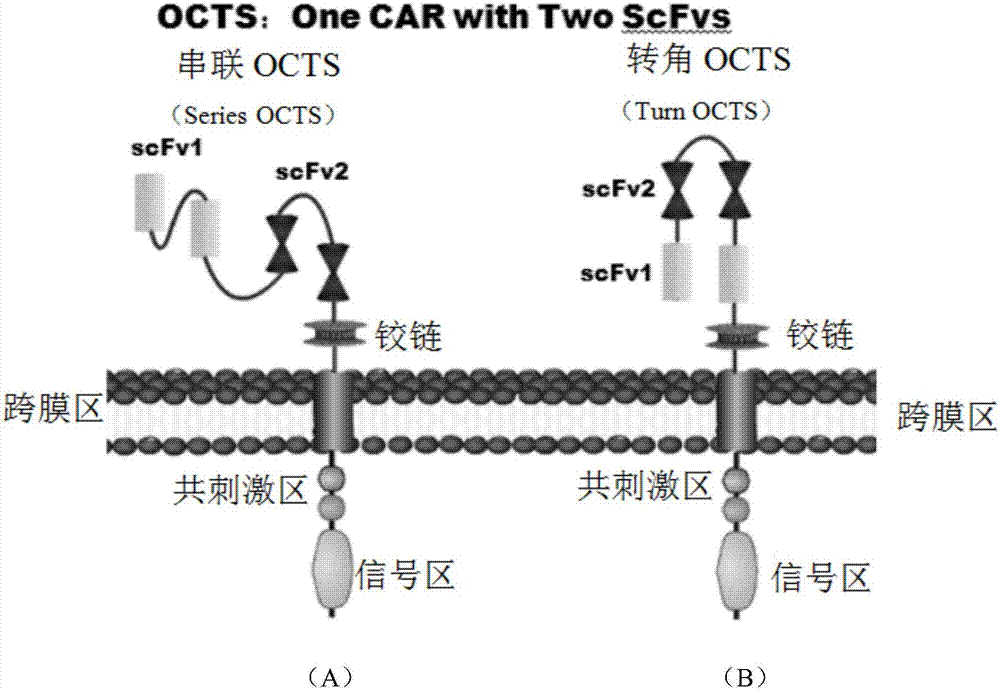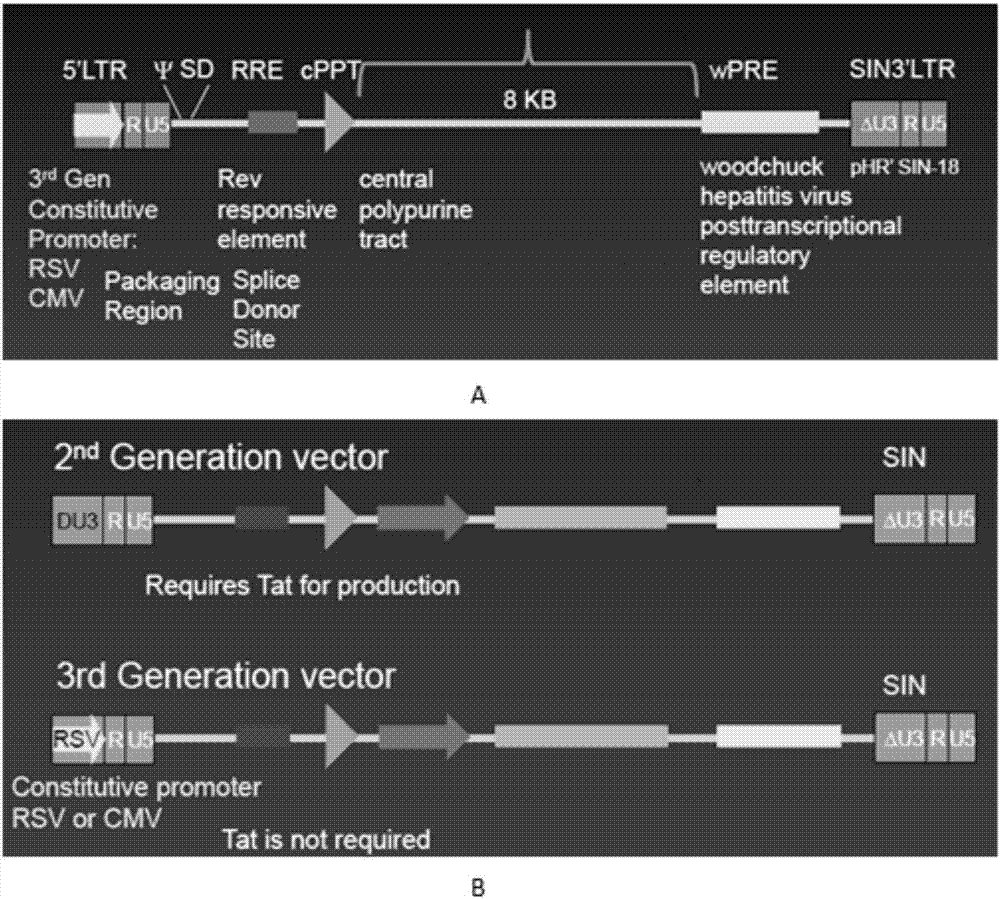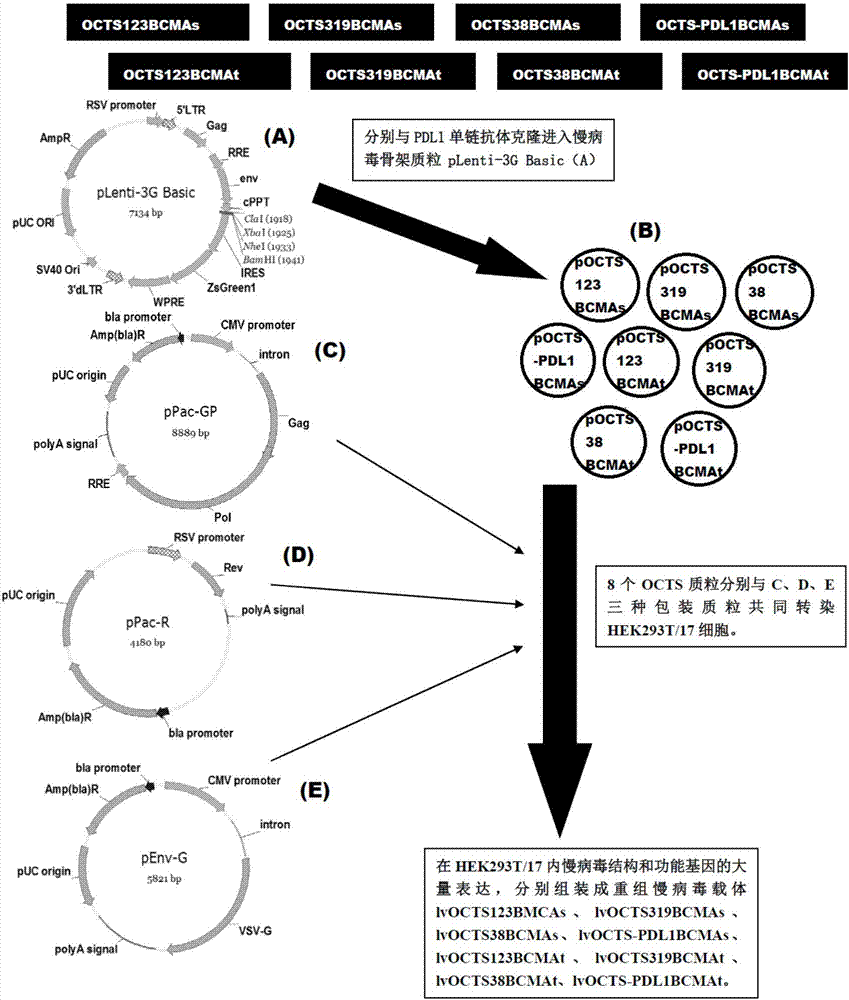OCTS-CAR double-targeting chimeric antigen receptor, coding gene, recombinant expression vector and establishment and application of OCTS-CAR double-targeting chimeric antigen receptor, coding gene and recombinant expression vector
A technology of OCTS-CAR and chimeric antigen receptor, which can be used to target specific cell fusion, polypeptides containing positioning/targeting motifs, receptors/cell surface antigens/cell surface determinants, etc. It is difficult to transduce into primary T lymphocytes, the killing function is reduced, and the transduction cycle time is long, so as to eliminate the possibility of self-replication, expand the recognition range, and improve the transduction efficiency.
- Summary
- Abstract
- Description
- Claims
- Application Information
AI Technical Summary
Problems solved by technology
Method used
Image
Examples
Embodiment 1
[0089] Example 1 Construction of OCTS-CAR-T cells
[0090] 1. Construction, purification and detection of recombinant lentiviral vectors lvOCTS123BCMAs, lvOCTS319BCMAs, lvOCTS38BCMAs, lvOCTS-PDL1BCMAs, lvOCTS123BCMAt, lvOCTS319BCMAt, lvOCTS38BCMAt, lvOCTS-PDL1BCMAt
[0091] Such as image 3 As shown, the construction method of the recombinant lentiviral vector of the present invention is as follows:
[0092]1. Cloning human EF1α promoter, OCTS-based CAR dual-targeting chimeric antigen receptors (OCTS123BCMAs, OCTS319BCMAs, OCTS38BCMAs, OCTS-PDL1BCMAs, OCTS123BCMAt, OCTS319BCMAt, OCTS38BCMAt, OCTS-PDL1BCMAt), and PDL1 single-chain antibody into lentivirus The backbone plasmid pLenti-3G basic was used to obtain recombinant lentiviral plasmids pOCTS123BCMAs, pOCTS319BCMAs, pOCTS38BCMAs, pOCTS-PDL1BCMAs, pOCTS123BCMAt, pOCTS319BCMAt, pOCTS38BCMAt, pOCTS-PDL1BCMAt.
[0093] (1) The lentiviral backbone plasmid pLenti-3G basic was double-digested with Cla I and EcoR I restricti...
Embodiment 2
[0217] Example 2 OCTS-CAR-T cell pathogen detection and expression detection
[0218] 1. Endotoxin detection;
[0219] (1) Endotoxin working standard is 15EU / cartridge;
[0220] (2) Limulus reagent sensitivity λ=0.25EU / ml, 0.5ml / tube
[0221] (3) Dilution of endotoxin standard substance: Take one endotoxin standard substance, dilute it with BET water in proportion to dissolve into 4λ and 2λ respectively, seal with parafilm, shake and dissolve for 15 minutes; each dilution step should be diluted in a vortex mixer Mix well for 30s;
[0222] (4) Adding samples: Take several LAL reagents, add 0.5ml of BET water to dissolve each, and distribute to several endotoxin-free test tubes, each with 0.1ml. 2 of them are negative control tubes, add 0.1ml of BET water; 2 are positive control tubes, add 0.1ml of endotoxin working standard solution with 2λ concentration; 2 are sample positive control tubes, add 0.1ml of endotoxin standard containing 2λ sample solution (1ml of 20-fold dilut...
Embodiment 3
[0253] Example 3 Functional detection of OCTS-CAR-T cells
[0254] 1. Evaluation of target cell killing effect.
[0255] (1) Culture target cells separately [BCMA + K562, CD319 + K562, CD38 + K562, PDL1 + K562, CD123 + K562, BCMA + CD123 + K562, BCMA + CD319 + K562, BCMA + CD38 + K562, BCMA + PDL1 + K562, K562 cells] and effector cells [OCTS-CAR-T cells], the groups of effector cells co-incubated with single target cells and double target cells are shown in Table 9.
[0256] Table 9 Grouping list of effector cells co-incubated with single target cells and double target cells
[0257] effector cells
target cell 1
target cell 2
target cell 3
OCTS123BCMAs-CAR-T
CD123 + K562
BCMA + K562
BCMA + CD123 + K562
OCTS319BCMAs-CAR-T
CD319 + K562
BCMA + K562
BMCA + CD319 + K562
OCTS38BCMAs-CAR-T
CD38 + K562
BCMA + K562
BCMA + CD38 + K562
OCTS-PDL1BCMAs-CAR-T
PDL1 +...
PUM
| Property | Measurement | Unit |
|---|---|---|
| Sensitivity | aaaaa | aaaaa |
| Absorbance | aaaaa | aaaaa |
Abstract
Description
Claims
Application Information
 Login to View More
Login to View More - R&D
- Intellectual Property
- Life Sciences
- Materials
- Tech Scout
- Unparalleled Data Quality
- Higher Quality Content
- 60% Fewer Hallucinations
Browse by: Latest US Patents, China's latest patents, Technical Efficacy Thesaurus, Application Domain, Technology Topic, Popular Technical Reports.
© 2025 PatSnap. All rights reserved.Legal|Privacy policy|Modern Slavery Act Transparency Statement|Sitemap|About US| Contact US: help@patsnap.com



